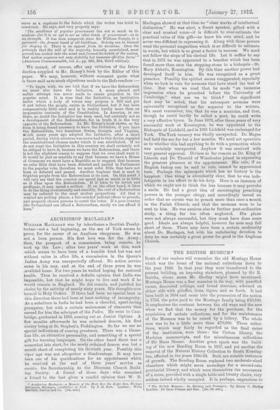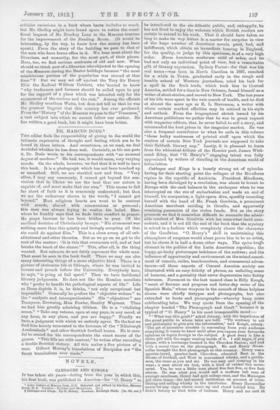THE BRITISH MUSEUM.*
SOME of our readers will remember the old Montagu HOLM which was the home of the national collections down to the year 1849. In that year they were transferred to the present building, an imposing structure, planned by Sir R. Smirk's, whose name Mr. Shelley might have mentioned. Montagu House was a fine mansion in its way, with panelled rooms, decorated ceilings, and broad staircase, adorned on either side with giraffes, lions, tigers, and so forth. It had been built in 1684 and came into the possession of the nation in 1753, the price paid to the Montagu family being 210,500. It emphasizes the contrast between the old ways and the new when we find that the money for the purchase, for the acquisition of certain collections, and for the maintenance of the Museum was to be raised by a lottery. The whole sum was to be a little more than 270,000. These collec- tions, which may fairly bo regarded as the final cause of the institution, were three : the Cotton library, the Harleian manuscripts, and the miscellaneous collections of Sir Hans Sloane. Another great epoch was the build- ing of the new Reading Room in 1857, and yet another the removal of the Natural History Collection to South Kensing- ton, effected in the years 1880-83. Both are notable instances of growth. The Reading Room replaced two moderate-sized chambers which might serve nowadays for a second-rate provincial library, and which were themselves the successors of a room, provided with a single table and twenty chairs, very seldom indeed wholly occupied. It is, perhaps, ungracious to • The itr;tish Musson: its History end Treasures. By Henry C. Sbollay London : Sir Isaac Pitman and Son. (12s. lid. nat.]
criticise omissions in a book where haste includes so much, but Mr. Shelley might have found space to notice the muni- ficent bequest of Mr. Stuckey Lean to the Museum trustees for the improvement of the Reading Room. (It would be interesting, by the way, to know how the money has been spent,) From the story of the building we pass to that of the men who have borne office in it. We hear most about the librarians, not unworthy, for the most part, of their places. Here, too, we find curious contrasts of old and new. What should we think now of a librarian who objected to the opening of the Museum during the Easter holidays because "the most mischievous portion of the population was abroad at that time " P But we may set off against the Tory Sir Homy Ellis the Radical William Cobbett, who 'wanted to know "why tradesmen and farmers should be called upon to pay for the support of a place which was intended only for the amusement of the curious and the rich." Among the officials Mr. Shelley mentions Watts, but does not tell us that be was the greatest linguist that this country has ever produced. From the "History "of the Museum we pass to the" Treasures," a vast subject into which we cannot follow our author. He has written a good book, but it might have been better.























































 Previous page
Previous page